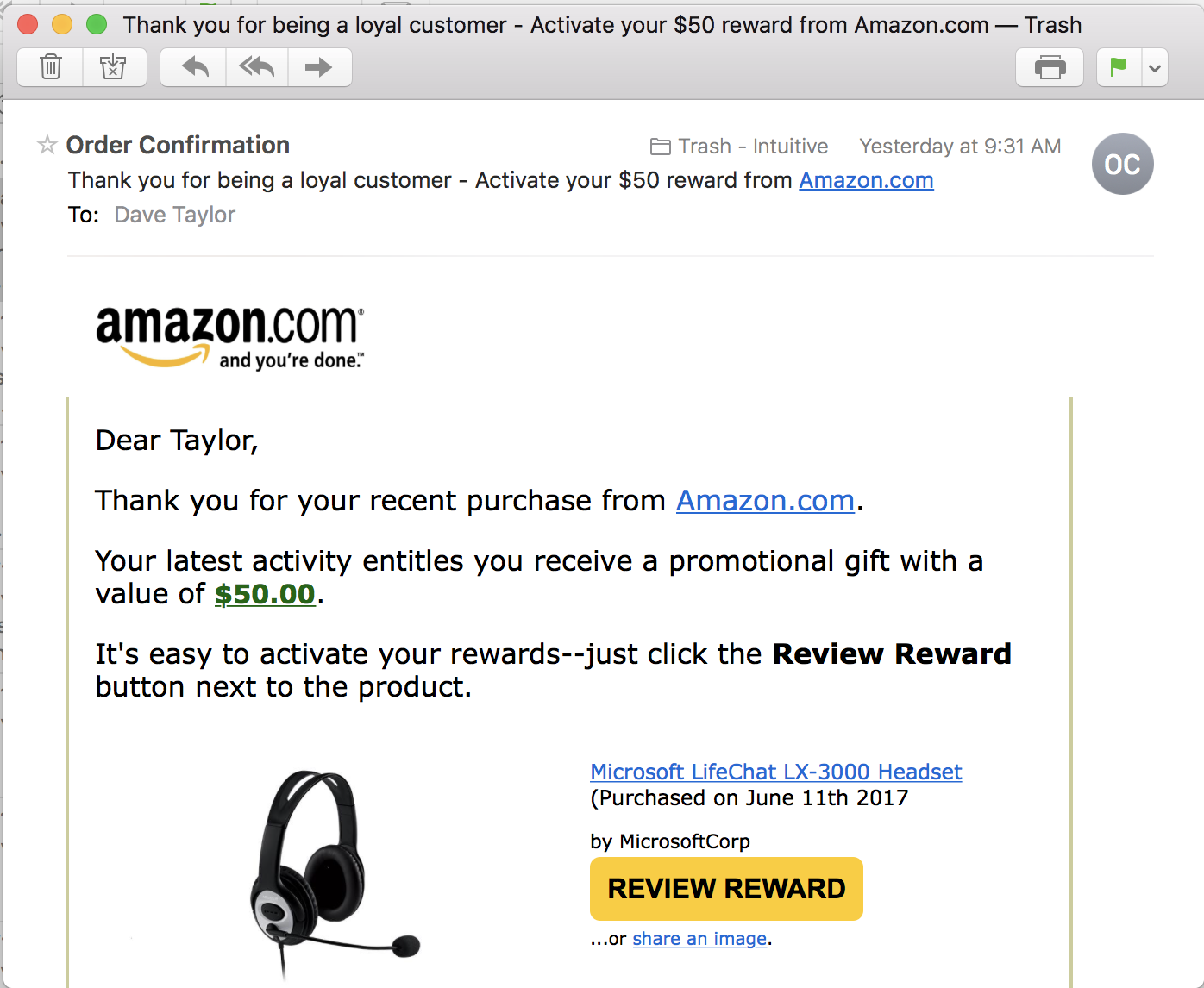Hi Dave! I got an email from Amazon that I’d won a headset and just needed to click to confirm, but when I clicked on the Rewards button, I ended up on a survey site. What’s wrong with the link, the headset looks very nice?
While it would be nice to report that everyone on the Internet is a nice person that has your best interests at heart, the fact is that underneath the funny jokes, pictures of kittens and email from your long-lost cousins, there’s an underbelly of criminal activity. Worse, these con artists and hackers have very malicious intention and know that they can steal from you online, make a quick $100 by selling your credit card info, even make a few dollars by getting your name, physical address, phone number and other personally identifiable information.
In other words, if it seems too good to be true, it is.
Be skeptical. Be really skeptical of anything that shows up in your inbox – even if it seems like it’s from a friend – that just seems like too good a deal. There really aren’t princes in Nigeria wanting to give you vast amounts of money, medical miracles that you can only buy from Eastern Europe, and hot men and women eager to get intimate with you if you’ll only share some of your personal information with them.
Oh, and Amazon doesn’t give away product through its Rewards program even if you’re the most loyal customer in the world.
Fortunately I can show you exactly the situation you’re talking about because – go figure! – I also got the very same come-on telling me I’d won a $50 value product from Amazon Rewards. Here’s the email I received:

Before we go any further, let’s analyze what it says here. First off, it suggests that I purchased the Microsoft LifeChat LX-3000 Headset just a few days ago, on June 11, 2017. I didn’t. But it’s the typos that give away these sort of phishing and related scams. Notice there’s an opening paren but no closing parent. Notice there’s no comma after “11th”, and that MicrosoftCorp is a single word not the proper two words. The Amazon.com logo is a bit squished horizontally too, but that’s something only a branding expert would likely notice.
Still, most people don’t get into the nitty gritty of grammar and design when they read an email, particularly one where you’ve won something! Hurray! Light the Fireworks!
Yeah, no. Slow down there, camper!
Apple Mail does something very nice if you move the cursor over a link: it shows where you’d go if you clicked on it. Most other email programs have a similar feature and it’s smart to get into the habit of using it, because look where the “LifeChat” link actually points:

Besotter-Opium? What the heck? More importantly, notice the base domain: www.amasonreward.com. You can absolutely be assured that Amazon would never use a domain with an ‘s’ instead of the ‘z’ in its name. Trademarks, and all that.
But if you look at the sender email address, you’ll see a similar warning flag:

Again, the Amasonreward.com domain in use. ¡¡No bueno!!
Still, these scammers are smart and tricky folk, so let’s say you did click on the big yellow “Review Reward” button expecting to pop over to the Amazon site. You don’t. You end up here instead, as you learned:

I’ve been selected to participate in an anonymous survey! How exciting.
not.
Let’s say that after you scratch your head and wonder where that free headset went, you DID actually answer all the questions. Now what? Turns out these are gateways to lead sites where they get paid a few cents to push a lead to a merchant for subsequent marketing efforts. You answer the survey questions, they send it to a half dozen of those, they just made $0.50 off your efforts and you? You get zip. In fact, on the last page you see these sort of offers:

Ah man, we almost got the Apple iPad Pro 12.9-inch screen for $0.00. But it’s out of stock. Oh, and it’s rather a bit more than $299.99 regular price for this very nice device. But of course it’s out of stock – they never had it in stock because they don’t want to sell you anything, you’re just going to bounce to yet another survey, yet another promo, yet another solicitation because now you’re in the Black Hole of Calcutta, the hall of mirrors that is the nature of these scams.
Your best solution? Just be skeptical, remember there’s no free lunch, and delete these scams before your first click.
And stay safe out there!
